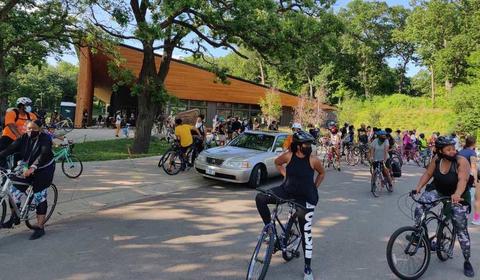
Slow and Steady

When Anthony Taylor was a kid, he remembers feeling an enormous sense of freedom when he was out biking around the streets of his hometown of Milwaukee. Now an avid sport cyclist and bicycling activist, he has dedicated himself to making bike riding more accessible and enjoyable, particularly for African Americans.
He is also the co-founder of the Major Taylor Bicycling Club of Minnesota—named in honor of Marshall Walter “Major” Taylor (no relation to Anthony Taylor), the first American-born Black champion in any sport and a world champion cyclist in 1898. Geared toward competitive athletes, the bicycling club has grown into a network of clubs around the country.
Adults who aren’t interested in competing, but would just like to get more comfortable with riding a bike, participate Slow Roll Twin Cities, which Taylor also founded. “I finally realized that Major Taylor wasn’t the best way to get people who don’t really bike to try it when I discovered that they were doing these Slow Roll rides in Detroit to get people on bikes and out rediscovering their city,” he recalls. After first partnering with bike shops, he decided in 2016 to focus less on the bikes and more on people and began collaborating with arts organizations and community-based groups, including UROC.
“Partnering with UROC meant anchoring the program in the neighborhood, and that was the vibe we wanted,” Taylor explains. Rather than a workout, Slow Roll reacquaints people who may not have been on a bike in years with the fundamentals of biking, so they can feel safer and more confident. Rides often begin at UROC, or another starting point, with a poetry reading, singing and a live DJ before everyone heads out on a route that takes them to a public park, new businesses in the area, downtown Minneapolis, the University of Minnesota or the Walker Art Center.
People often think of the Northside as being disconnected from downtown and the University, but these rides can help change that feeling, Taylor says: “People don’t know their neighborhoods because their cars teleport them in and out, and these rides show people that they can move in and out of spaces while being with other people and experiencing music and song and joy. Slow Roll really puts people IN the community in a way that cars and mass transit don’t.”
Being comfortable with biking alone or in groups has become even more important during the pandemic as many people look for safer ways to get outside or to work. That’s why, in addition to bike rides, Slow Roll recently helped organize a bike giveaway at UROC in partnership with Allina Health and Free Bikes for Kids. “We gave 300 bikes to essential workers who are on the front lines at hospitals or doing childcare or working in stores,” Taylor says, explaining that the bikes were given out with equity in mind and primarily went to low-income people of color and women.
In the future, Taylor would like to connect Slow Roll more broadly to the University of Minnesota, which is committed to community partnerships that impact the social determinants of health. “I would really like to see this project be connected to the University’s resources, talent and research,” he explains. “We’re very focused on adults where energy in challenged communities is usually focused on youth. What we’re saying is, if we impact the adults in the community on goals that have value for them, you can change the community for the better for everyone.